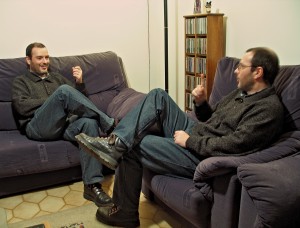With so many “healers,” coaches, counselors, psychotherapists, and psychologists out there practicing thousands of methods, there are many misconceptions about what therapy is and isn’t. I can’t dispel all the myths, but here are a few things I’d like you to know.
 1. People who go to therapy are not crazy. You are not crazy.
1. People who go to therapy are not crazy. You are not crazy.
We all have challenges and unique ways of approaching them. Most people feel like they are unique and nobody has ever had the thoughts, feelings, or behaviors that they have. Guess what? We are all human. There is nothing inherently bad, embarrassing, or shameful about anything you are thinking or experiencing. Most of us only feel this way because we don’t take the risk to be vulnerable and share the details of our inner worlds with others. You can be assured, no matter what you are facing, it may be challenging, you may be coping in ineffective ways, but you are not crazy.
2. Relationship is everything.
There are literally thousands of theories and techniques for doing therapy. You know what the one thing is that research shows will be a predictor of a successful outcome? Relationship. The level of trust and safety you feel with your therapist is the best predictor of success. If you don’t feel able to explore the deeper levels of truth first with yourself and also with your therapist, it will be really hard to make lasting changes. Trust and relationship take time to build, really. It can’t be rushed. It is the most important thing we will do. Nobody exists outside of some sort of relationship, and most of us have limited or no access to a truly supportive, deeply caring, and profoundly accepting relationship like can be developed here.
3. I’m not here to give you advice.
You will probably want it at some point, but I am not the expert in you or your life. You are. My job is to help you gain more trust and confidence in your own ability to lead your own life. I will gladly offer  reflections of what you are saying, what it seems like you are saying that you are not aware of, and questions to help you get more clear, but your life is yours to live.
reflections of what you are saying, what it seems like you are saying that you are not aware of, and questions to help you get more clear, but your life is yours to live.
4. My job is not to psychoanalyze you.
See above. A good therapist will not claim to have all the answers. I certainly don’t. We are humans just like you. You are the expert in you. My job is to help you peel back the layers to become even more intimate with yourself, so that you know and feel that you are indeed the only one who can be the expert in you. And you are the only one that can make the changes in your life. My job is to be curious as we explore the unknown together, and maybe I can guide a little and empower you to continue with your own self-leadership.
5. All emotions are welcome. Especially anger.
Most of us have a challenged relationship with our emotions. Either we don’t feel or acknowledge them at all or we are totally ruled by them. Neither is helpful. Emotions serve a purpose: they repel us from things that aren’t good for us and bring us closer to things that are. Ignoring the wisdom of your emotions results in poor decision making and disconnection from yourself. And yet if your emotions are controlling you, you probably could use some balance by engaging your thoughts and rational mind more. The point is, therapy provides a safe and welcoming space where all your emotions are welcome, valid, and supported, even the ones that get a bad reputation such as anger. Emotions are an important part of being human.
6. You will probably backslide to old behavior patterns and I won’t judge you.
Most of us have been engaged in habitual thinking and automatic behaviors for a long time. There is a saying in neuroscience that says, “neurons that fire together wire together.” The longer you have a habitual way of thinking or behaving, the more that pattern gets imprinted in our brain. Our old patterns are kind of like the most popular hiking trails near town – they are well-trodden and easy to find. But when you try to make changes to your thinking and behaving, it is like starting a new trail by simply veering off the main trail. It takes many times walking the new path to wear it in, and even then it is still faint. It is much easier, safer, and more comfortable to stay on the familiar trail. It takes much more effort and intention to forge a new trail, but with time, it will also be easy for you to find and then you will have a choice of which path to take. Relapse is part of the change process, it is not failure. This is another reason it helps to have a guide who knows the terrain.
7. You deserve to be happy and only you are in control of that. I want to support you in having the life you want.
This is a complicated topic, but I want you to know that you only have one life and you deserve to enjoy it. Even if the changes you want to make seem huge and there are a lot of factors that seem in your way – relationships, finances, family, job, education, and more, there are ways to be happy in any circumstance, and there are ways to move toward something better for you. It’s worth it.
8. Therapy is weird. And special. And priceless. And takes courage.
Before people come to therapy, they usually try almost everything they can think of to do it on their own. Some approaches are helpful, others are not. People come to therapy for all kinds of different reasons. Therapy can help with many mental, emotional, and relational challenges – and even some physical (somatic) symptoms. But it can be hard to meet with someone who is a total stranger at first and talk about the most vulnerable and personal things that we sometimes don’t even want to share with our closest friends or family. And that is part of what makes it special and priceless. For most of us, we can’t find any other relationship like this where it is safe to talk about anything, and have it met with 100% acceptance, no judgment, and even some gentle support on how to do things differently.
Our automatic habitual thoughts and behaviors are mostly unconscious. Without outside input, it is likely we will stay stuck doing and thinking the same thing. When you are ready for a trained guide to take you out of the familiar and into a new life, we’ll be here. See you then.
~chuck
Edit: Right after publishing this, I came across this post written from a therapy client. Great insights from an experienced client’s perspective.
What do you think? Better yet, what do you feel? What do you experience? Let’s continue the conversation! You can find me at www.innerlifeadventures.com or email [email protected]. Want to meet? Here’s how.
Chuck Hancock, M.Ed, LPC is a National Certified Counselor, Licensed Professional Counselor, and a Registered Psychotherapist in the state of CO. He has completed comprehensive training in the Hakomi Method of Experiential Psychotherapy, a mindfulness mind-body centered approach. Chuck guides individuals and groups in self-exploration providing them with insight and tools for change. He also incorporates nature as a therapy tool to help shift perspective and inspire new patterns.

